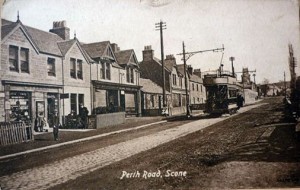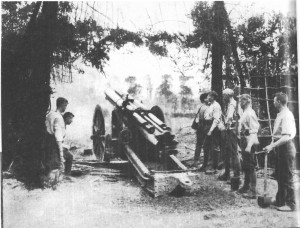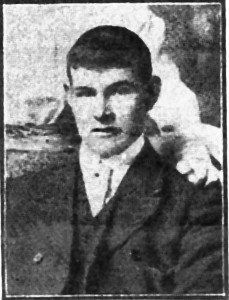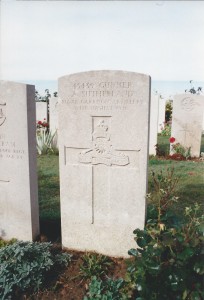Alexander Sutherland
Britain’s Declaration of War
The following official announcement issued by the foreign office at 12.10am
“Owning to the summary rejection by the German Government, of the request made by his Majesty’s government; for assurance that the neutrality of Belgium will be respected. His Majesty’s Ambassador of Britain has received his passport. His Majesty’s Government of Britain has declared to the Germen Government that a State of War exits between Great Britain and Germany as from 11pm 4th August 1914.”
Gunner Alexander Sutherland, known as Alex was born on 29th May 1884 to James and Mary who lived in Golspie in Sutherlandshire, now part of the Highlands and Islands. According to the 1891 census, this was a fishing village and his father was a fisherman. Alexander & Williamina Sutherland had 7 boys and 2 girls, with Alex being the eldest.
The Scone Roll of Honour tells us he joined the Navy at an early age, leaving in 1905 at the age of 21.
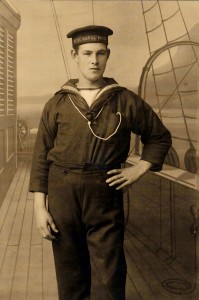
Alex then moved around Scotland, firstly employed as a coal miner in Bonnyrigg, a small town six miles south east of Edinburgh. It was while he was here that he met and courted Irvenia Davidson. Alex married Irvenia in 1907 at Cockpen, Midlothian.
By 1914 Alex was employed by Perth Corporation Tramways, who operated a tramway service in Perth from 1903 to 1929. The main routes of these trams are today reflected in the Number7 Bus route, going from Scone to Cherrybank, Perth.
Time line photos
Alex and Irvenia are known to have lived at Pitrodie Building or Bruce Building in Perth Road Scone, Perthshire. They had one son Alexander; four girls; Annie, Sophia, Ina and Jessie Alex enlisted at the age of 30, on October 16th 1914 and joined the Royal Garrison Artillery, which composed of 104 service companies. In 1900, 40 of them were in the U.K, 37 in various colonies of the Empire and 27 in India.
The Royal Garrison Artillery developed from fortress-based artillery located on British coast from 1914. They possessed very little heavy artillery but grew into a large component of the British Forces. This regiment was armed with heavy, large calibre guns and howitzers, a gun characterized by its short barrel. In Europe, these were positioned some way behind the front line and had immense destructive power.
60 pounder in action
Gunner Alex Sutherland service number is 45439, served with the 25th Siege Battery. Given the information available, he was entitled to the Victory Medal; this medal was awarded to all who received the 1914 Star or the1914-1915 Star. It was never awarded alone, but with three medals sometimes referred to as Pip, Squeak and Wilfred. Eligibility for this award consisted of having been mobilised, fighting and having served in any of the various military organisations in the theatre of operation.
Scone roll of honour
Gunner Alex Sutherland was a gallant and brave man, enduring the continual barrage at the Western Front. While the Royal Garrison Artillery worked as teams to enable their guns to perform supporting the men in the trenches, they were targets for larger German guns. He must have experience the mud, noise and smells of war and the effect of living with danger and death. The Battle of the Somme offensive was fought by the British and French armies against the Germen Empire. It took place between 1st July and 18th November 1916. The Allies’ purpose was to engage and draw in as much of the German manpower as they could and to destroy it. This battle was one of the largest, bloodiest battles in human history with British casualties of over 57,470 men wounded or killed. Amongst those Gunner Alex Sutherland, who died on the 6th August 1916 just over 2 years since the declaration of war.
Gunner Alex Sutherland is buried in Peronne Road, British Cemetery, Maricourt, France, which is on the western outskirt of the village. Maricourt is a village approximately 11 Kilometres east of Albert on the road to Peronne, not far from the River Somme. Peronne was occupied by the German troops throughout WW1 and was finally liberated on 2nd September 1918 by the Australian Troops.
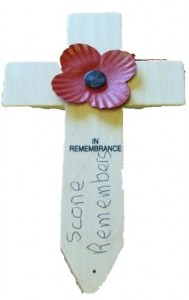
He was survived by his wife Irvenia and their five children. The last address that our researches could link to Irvenia Sutherland was in the Perthshire Advertiser 12th May 1934 stating that she lived in Perth.
We would like to thank Alex Sutherland’s relatives, who still live locally, for sharing their photos and information with us.
Refrences
1881, 1891, 1901 census
Scone Roll of Honour
Perth Corporation Tramways’
Forces of War family information
The Royal Garrison History
Sites of WW1 Gide Somme Tourisme
The Constitutional

